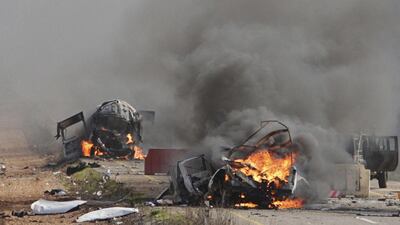Hizbollah’s attack this week on an Israeli military convoy in occupied Shebaa Farms, that killed two Israeli soldiers and wounded seven others, was strong and effective. But it does not seem to have been the anticipated retaliation for the Israeli air strike on January 18 that killed six Hizbollah fighters and an Iranian general in Syria, commented the London-based daily Al Quds Al Arabi in an editorial.
The attack in Shebaa Farms was calculated to hit Israeli targets without dragging Israel into a war at an inopportune time for Hizbollah, which is busy fighting on the Syrian front. The strike, it seems, sought to draw Tel Aviv into a war of attrition on occupied territories in southern Lebanon and the Golan Heights.
A day before the Shebaa Farms operation, rockets fired from a Hizbollah-controlled Syrian airbase landed on Israeli military sites in the occupied Golan Heights. Through the two operations, the paper remarked, Hizbollah and its major backer, Iran, were trying to restore tension on these two fronts after a calm that seemed to have lasted too long.
Apart from minor incidents, peace has prevailed for eight years on the southern Lebanon front, while the Golan Heights has not see any bloody attacks for more than 40 years, the editorial said. With the recent strike, Hizbollah seems content with sending Israelis living in those areas to shelters and ridding Mount Hermon of Israeli tourists and skiers.
On the Israeli side, prime minister Benjamin Netanyahu is going to capitalise on this tension to sway Israeli voters by promoting himself as the strong man who is capable of achieving a deterrence capability for Israel. His response, however, is highly unlikely to go beyond a few calculated air strikes to avoid pulling the region into a wider conflict, exposing Israelis to Hizbollah rockets and therefore harming his popularity seven weeks before his country’s elections.
Mr Netanyahu will not hesitate to cash in on the tension on several fronts, especially in his continuing diatribe against Iran, which he has blamed for the attack on Wednesday. Not only will the Israeli premier use the Hizbollah assault in his campaign against Iran’s nuclear programme, he might use it to escalate his criticism of the policies of US president Barack Obama .
On the other hand, the escalation is also an opportunity for Hizbollah to remind Israel of its capabilities and restore some of the popularity it lost after its involvement in the Syrian war, the paper concluded.
Writing for the Jordan-based daily Addustour, Oraib Al Rantawi said many commentators had argued that Hizbollah would not dare retaliate for the killing of its six fighters and the Iranian general, despite Israel itself anticipating a revenge attack. He added that he did not agree with others who thought the two rockets that struck the Golan Heights would be pretty much the extent of the Hizbollah response.
Al Rantawi said that media commentators would now be divided into several groups, including those who will just keep quiet, wishing that the Hizbollah attack had not happened, and others who will turn 180 degrees and start chorusing again that “Hizbollah wants to entangle Lebanon to serve foreign agendas”. Some might even say that the response was restricted and probably coordinated with the Israelis based on a nonsensical theory that Hizbollah and Iran are in alliance with Israel and the US for the purpose of keeping the Syrian regime in power.
After the strike, Hizbollah managed to throw the ball into Mr Netanyahu’s court and surmount the bind in which it either had to choose embarrassing silence or a costly retaliation. Today, Israel finds itself in a similar situation: either getting caught up in a vicious circle of calculated strikes and counter strikes – an option wanted by Hizbollah but not by Israelis – or biting the bullet on the grounds that the score was even. A third option, the writer said, would be for Israel to have an extreme reaction that could drag the entire region into a full-scale confrontation – something that might spell the end of Mr Netanyahu’s political career.
At the moment, Al Rantawi said, Hizbollah seems to be on top. It has honoured its vow and carried out a bold operation. Israel, on the other hand, must realise that it does not have free rein and that there are limits to its military might and feeling of superiority.
Translated by Abdelhafid Ezzouitni
AEzzouitni@thenational.ae

